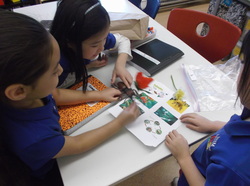
"I see and feel the pollen!"
"The nectar tastes like sugar and honey!"
"I see lots and lots of seeds! Wow...will they grow into new flowers?"
Great observations and questions, first grade! Keep up the great work!
Agricultural engineers play and important role in all our lives. Since we all depend on agriculture in some way or another, their work is very important! First graders will be learning about plant and insect parts, and the role that both these organisms play as part of a pollination system. As agricultural engineers, they'll also be discovering some of the problems that can arise when the pollination system isn't functioning properly, and of course, they'll come to the rescue developing solutions!
 As part of our agricultural engineering unit, first graders took flowers apart to better understand they way they are structured. This will help students better understand the pollination system that exists between insects and flowers. Here are some great observations they made: "I see and feel the pollen!" "The nectar tastes like sugar and honey!" "I see lots and lots of seeds! Wow...will they grow into new flowers?" Great observations and questions, first grade! Keep up the great work!  So why is pollination so important to agricultural engineers? Pollination is a process by which pollen is moved from flower to flower. Most often, pollen is moved by insects, but the wind and water can also help pollinate flowers. Insects land on flowers not because they are attracted to the pollen, but rather to the sweet smelling nectar inside. The nectar is insects food. First graders participated in a working model for how pollination works. Using paper bag flowers, their hands as bees, and cheese puffs as nectar, they quickly realized that they were picking up and dropping off "pollen" without even knowing it. When pollen is transferred from flower to flower, there's a good chance that a new seed will develop! And new seeds grow fruit around them  Since most first graders hadn't been exposed to the words "agriculture" or "agricultural," we started our unit with a Mystery Bag that contained items related to our study our agricultural. Agriculture is officially defined as: the science or practice of farming, including cultivation of the soil for the growing of crops and the rearing of animals to provide food, wool, and other products for human use! We'll be digging deeper into this "nature-focused" field of engineering, discovering relationships between animals and plants. We'll also be discovering what happens when agricultural engineers need to step in and help solve problems related to nature. |
PollinationWhat would our world be like without pollinators? Archives
May 2014
Categories |